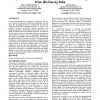Free Online Productivity Tools
i2Speak
i2Symbol
i2OCR
iTex2Img
iWeb2Print
iWeb2Shot
i2Type
iPdf2Split
iPdf2Merge
i2Bopomofo
i2Arabic
i2Style
i2Image
i2PDF
iLatex2Rtf
Sci2ools
115
click to vote
KDD
2004
ACM
2004
ACM
Bayesian Model-Averaging in Unsupervised Learning From Microarray Data
Unsupervised identification of patterns in microarray data has been a productive approach to uncovering relationships between genes and the biological process in which they are involved. Traditional model-based clustering approaches as well as some recently developed model-based mining approaches for integrating genomic and functional genomic data rely on one's ability to determine the correct number of clusters or modules in the data. In this paper we demonstrate that the performance of such methods in general can be significantly improved by accounting for uncertainties inherent to the process of identifying the optimal number of clusters in the data. We demonstrate that the Bayesian averaging approach to clustering via infinite mixture model offers a more robust performance than the traditional finite mixture model in which the optimal number of clusters is determined using the Bayesian Information Criterion. This performance improvement is demonstrated through a simulation st...
Data Mining | Infinite Mixture Model | KDD 2004 | Model-based Clustering Approaches | Model-based Mining Approaches |
Related Content
| Added | 30 Nov 2009 |
| Updated | 30 Nov 2009 |
| Type | Conference |
| Year | 2004 |
| Where | KDD |
| Authors | Mario Medvedovic, Junhai Guo |
Comments (0)

